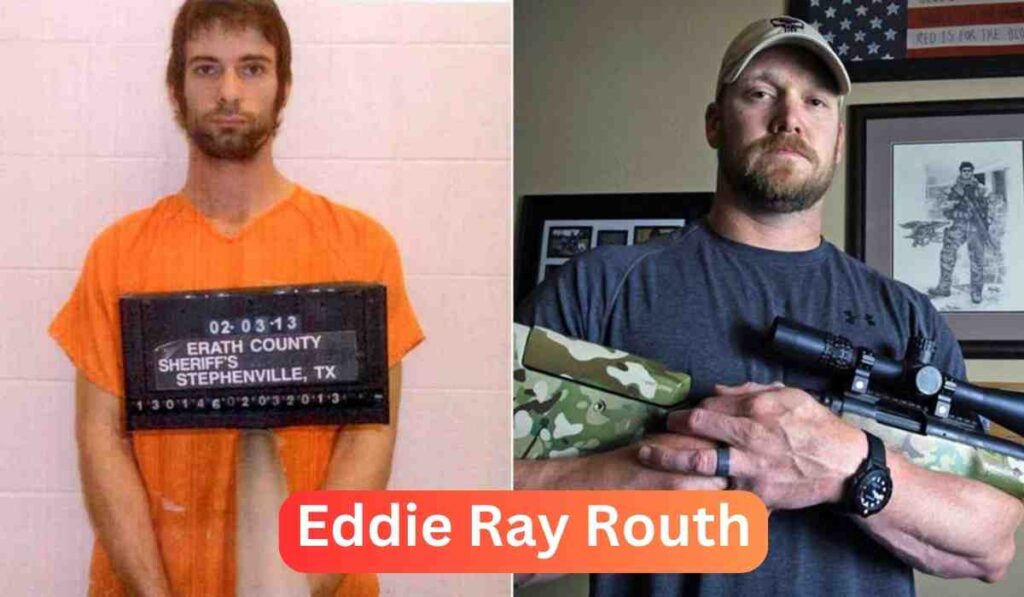The brutal killing of former Navy SEAL Chris Kyle and his friend Chad Littlefield by Eddie Ray Routh on February 2, 2013, near Chalk Mountain, continues to be a sordid episode in American history.
This article explores the details of the terrible event and combines information from two rival data sets to present a comprehensive summary of the shooting range disaster at Rough Creek Ranch-Lodge-Resort in Erath County, Texas.
The Murders
Routh shot and killed Kyle and Littlefield on February 2, 2013, an unfortunate day when they were both carrying weapons but unaware of the threat.
Anything other than the events detailed in the incident report could have been the driving force behind the deaths at Rough Creek Ranch-Lodge-Resort.
The fact that Routh, a 25-year-old veteran of the Marine Corps, was suffering from post-traumatic stress disorder (PTSD) is a significant part of the tragedy.
The Confession Tape

The terrifying confession audio of Eddie Ray Routh, which was made public during the trial, shed light on the reason behind the killings.
Explaining that he could ‘clearly recognize him,’ Routh expressed a fear that he was being pursued and shot Kyle first.
This confession, made while being questioned by a Texas ranger, provides insight into the perpetrator’s mental condition as well as the perceived threat that precipitated this sad incident.
Recognizing the Offender: Eddie Ray Routh
Eddie Ray Routh was born on September 30, 1987, in Lancaster, Texas, and has dreamed of joining the Marine Corps since he was thirteen years old.
After serving four years, Routh’s life took a dark turn, and he was diagnosed with post-traumatic stress disorder in late July 2011.
Routh’s mental health declined despite being given medicine, which finally led to the horrifying crime that took the lives of two people.
The victims were Chad Littlefield and Chris Kyle.
Former Navy SEAL Chris Kyle, a veteran community leader, became well-known worldwide as the author of the critically acclaimed autobiography “American Sniper.”
His early death unfortunately ended his passion to aid other veterans, which was demonstrated when he took Routh to the shooting range as a therapeutic intervention. Kyle’s close buddy Chad Littlefield also perished in the horrible deed.
The Court Case and Legal Actions
Eddie Ray Routh was placed under bond for $3 million after being charged with two charges of capital murder on February 2, 2013.
The May 5, 2014, start date of the trial was postponed due to DNA testing requirements.Routh’s defence argued that he was mad by presenting conflicting expert opinions regarding his mental health.
On February 24, 2015, Routh was found guilty and sentenced to life in prison without the possibility of parole.
Military Background and Deployment:

At the age of thirteen, Eddie Ray Routh realised his desire of enlisting in the Marine Corps, and thus his military career began.
In September 2007, he was transferred to an area near Baghdad, where he served as a prisoner guard and fixed weapons for six months.
Routh’s experiences in a combat zone most certainly contributed to the development of post-traumatic stress disorder (PTSD).
Mission Humanitarian to Haiti:
As part of a humanitarian expedition to Haiti in January 2010, Routh displayed the range of experiences he had while serving in the military.
But, these encounters might have made his mental health issues worse when he got back home.
Rejection of Treatment:
Despite being diagnosed with PTSD and prescribed antipsychotics and antidepressants in late July 2011, Routh declined inpatient treatment offered by clinicians at the Veterans hospital.
This choice, along with the fact that he stopped taking his medicine, highlights the difficulties in providing veterans with mental health therapy.
Paranoid Personality Disorder and Drug Abuse:
According to Randall Price, a forensic psychologist who provided testimony on behalf of the prosecution during Routh’s trial, narcotics had exacerbated Routh’s paranoid personality disorder.
The co-occurrence of mental health issues and substance addiction casts question on the efficacy of existing veteran support networks.
Kyle’s Text Message and Foreboding Signs:
Prior to the shooting, Chris Kyle sent a text message to Chad Littlefield, stating, “This dude is straight up nuts.” Littlefield responded with military slang, “Watch my six,” indicating a sense of concern.
This exchange underscores the foreboding signs observed by those close to Routh and raises questions about the visibility of mental health struggles.
Post-Crime Behavior:

After the murders, Routh exhibited erratic behaviour. He first went to a Taco Bell, seemingly unaffected by the gravity of his actions, then went to his sister’s house in Midlothian, where he confessed.
His disjointed conversation about Hell, the end of the world, and voodoo with local police further highlights the severe mental distress he was experiencing.
Effect on Programs for Veterans’ Assistance:
The tragic result of Chris Kyle’s attempt to help soldiers through leisure activities raises questions about how well these kinds of programs work to address the complex issues that people with PTSD experience.
Discussions regarding the necessity for more thorough mental health treatment within veteran assistance programs were triggered by this incident.
Public Reaction and Legacy:
The public’s response to the murders and the ensuing trial revealed the connection between mental illness, celebrity, and the justice system.
Chris Kyle’s legacy as the “American Sniper” and the tragedy became entwined, sparking debates concerning the responsibilities and potential risks associated with popular figures engaging in charitable initiatives.
Frequently Asked Question (FAQs)
1. What was the reason for Eddie Ray Routh’s behaviour?
Eddie Ray Routh asserted that he thought Kyle and Littlefield were “headhunters” and that they would target him if he did nothing.
The catastrophic occurrence was caused by this paranoid perception of threat.
2. In what ways did Chad Littlefield and Chris Kyle attempt to assist Eddie Ray Routh?
Chris Kyle committed his post-military career to helping veterans. Littlefield and Kyle thought that taking Routh to the shooting range would assist with his PTSD (post-traumatic stress disorder).
3. Has Eddie Ray Routh received a mental health diagnosis?
Indeed, in late July 2011, Routh received a diagnosis of post-traumatic stress disorder (PTSD).
He was prescribed medication, but he refused to take it and quit receiving treatment.
4. How did Eddie Ray Routh’s trial turn out?
Eddie Ray Routh was convicted on February 24, 2015, for the murders of Chris Kyle and Chad Littlefield. The magistrate imposed a life sentence on him, with no chance of release.
Conclusion:
Eddie Ray Routh, Chris Kyle, and Chad Littlefield’s sad circumstances serve as a sombre reminder of the challenging challenges that sufferers of post-traumatic stress disorder must face.
This article attempts to address user intent and provide a comprehensive understanding of this tragic episode in American history by providing a thorough description of the tragedy.









